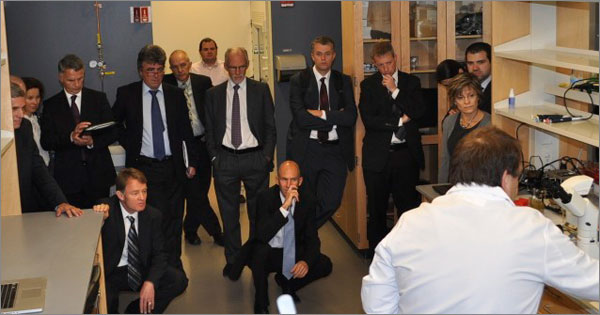Visit by high-level academic, public health, and research officials seeks to promote idea exchange, identify potential areas of collaboration
BOSTON, Mass. — The Wyss Institute for Biologically Inspired Engineering at Harvard University today welcomed a delegation, led by Swiss Federal Councilor Didier Burkhalter, to its facilities in the Longwood Medical Area. The visit was designed to promote the exchange of ideas and innovation strategies and to identify potential areas of future collaboration.

The Wyss Institute is dedicated to exploring the design principles found in nature and applying these insights to create and commercialize new bioinspired materials and devices in areas of industry that have never before been touched by the biological revolution. The Institute has also developed a unique model for technology innovation and collaboration that is gaining world-wide attention.
“We are extremely honored to welcome the members of this distinguished delegation,” said Wyss Institute Founding Director Donald E. Ingber, M.D., Ph.D. “We hope that today’s meeting will be the first of many productive exchanges that open the doors to innovative new ways of working together to bring about transformative change locally, nationally, and around the world.”
The Wyss Institute was founded in 2009 with a $125 million gift–the largest philanthropic gift in Harvard’s history–from Hansjorg Wyss. It operates as an alliance among Harvard’s Schools of Medicine, Engineering, and Arts & Sciences and in partnership with Beth Israel Deaconess Medical Center, Brigham and Women’s Hospital, Children’s Hospital, Dana Farber Cancer Institute, Massachusetts General Hospital, the University of Massachusetts Medical School, and Boston University.
Ingber led the group in a roundtable discussion that focused on the Institute’s innovation model, which emphasizes a cross-disciplinary, cross-institutional approach to research and development in which academics work side by side with technical experts who have industrial experience in product development and team management.
Howard Stevenson, Professor and Senior Associate Dean of the Harvard Business School, shared the Institute’s unique process for accelerating the translation of technology innovation from the lab to the marketplace.
In addition to Burkhalter, the Swiss delegation included Manuel Sager, Swiss Ambassador to the United States; Mauro Moruzzi, Head of the Division of Bilateral Research Cooperation; Christoph Ebell, Science and Technology Counselor to the Swiss Embassy; Gaudenz Silberschmidt, Chief of the Division of International Affairs of the Swiss Federal Office of Public Health; and Mirjam Christ-Crain, Professor of Biomedicine at University Hospital in Basel.
The delegation toured the Institute’s research labs, meeting with lead scientists and staff to discuss their work in projects that range from organs-on-microchips and whole genome engineering, to bioinspired robotics and medical devices that predict life-threatening medical events. Earlier in the month, the Institute was awarded a $3.3 million in funding from the National Institutes of Health and the U.S. Food and Drug Administration to develop a “heart-lung micromachine” for drug safety testing.
Today’s meeting was arranged by swissnex Boston, which acts as a physical and virtual environment fostering closer ties between Switzerland, New England, and Eastern Canada in academia, industry, and society.